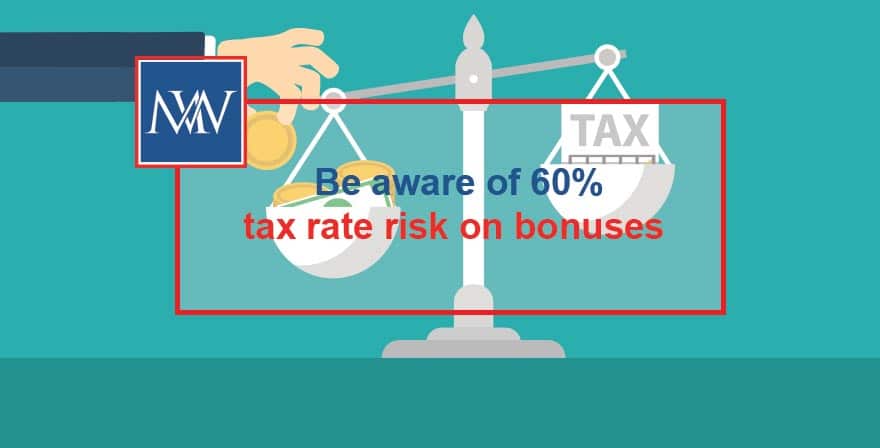
Be aware of 60% tax rate risk on bonuses
Topic:- Be aware of a 60% tax rate risk on bonuses
In the lead up to Christmas and the end of the financial year for many businesses, some directors and employees may be fortunate enough to be thinking of a bonus. If this is the case, it might be worth reviewing things beforehand to see if there is a risk of suffering effective tax rates of up to 60%, and if so, whether this can be avoided. The risk of paying a high effective tax rate on a bonus stems from the abatement of the personal tax allowance where the individual’s ‘adjusted net income’ is equal to, or above, £100,000 for a particular tax year.
The personal tax allowance for 2019/20 is £12,500, but this will be reduced by £1 for every £2 the taxpayer’s income is over that limit. The personal allowance may be reduced to nil from this income limit. Broadly, ‘adjusted net income’ is total taxable income before any personal allowances, less certain tax reliefs (including trading losses, Gift Aid donations, and pension contributions).
As a consequence of the personal allowance abatement rules, a taxpayer with income between £100,000 and approximately £119,000 will suffer marginal tax rates of up to 60% as the personal allowance is withdrawn.
Example
Graham is an employee of a company from which he draws a salary of £100,000 per annum He has no other sources of income. In December 2019 he will be paid a bonus of £7,000. He is entitled to a personal tax allowance of £12,500 in 2019/20, but he loses £3,500 of it (£1 for every £2 earned over £100,000 ((£107,000 – £100,000) /2)), leaving him with an allowance of £9,000. He will pay a tax of £2,800 (£7,000 × 40%) on the bonus, plus an extra £1,400 due to lost allowances (£3,500 × 40%). His total tax attributable to the bonus is, therefore, £4,200. Graham will, therefore, pay tax on the bonus at an effective rate of 60% (£4,200/£7,000 x 100).
Hannah, on the other hand, receives an annual salary of £125,000 from employment. She also has no other sources of income. Hannah is also expecting to receive a bonus of £7,000 in December 2019. She is entitled to a personal tax allowance of £12,500 in 2019-20, but she loses entitlement to all of it because her basic salary exceeds the point at which the allowance is fully withdrawn (£125,000). Receiving the bonus, therefore, results in no further adjustment to her personal allowance. She will simply pay a tax of £2,800 (£7,000 × 40%) on the bonus, which means that her effective tax rate on that part of his income is only 40%.
So, what action can be taken to minimise exposure to these marginal rates?
Taxpayers with an income slightly exceeding the £100,000 ceiling may avoid losing some or all of their personal allowance by taking steps to reduce ‘adjusted net income’ to below the abatement threshold. Options worth considering may include:
- Increasing pension contributions – for example, a taxpayer with income of £105,000 might consider making a pension contribution of £5,000. They will get 40% tax relief on the contribution, and the full personal allowance will be reinstated.
- Making donations to charity under the Gift Aid scheme. For the charity, the donation is assumed to be made a net of basic rate tax, which the charity claims back from HMRC. For the taxpayer, their basic rate tax band is increased by the value of the gross donation, which in turn reduces the amount of income to be taxed at a higher rate.
- Consider transferring income-producing assets to a lower-earning spouse or partner.
As with all tax planning opportunities, the wider picture should be considered before taking any action. In particular, the benefits of any tax saving need to outweigh the cost and administrative inconvenience of the transaction.
For More Information about Be aware of a 60% tax rate risk on bonuses, Book a Free Consultation
Need Accountancy Support?
For information on bespoke training, or if you have any other questions for Makesworth Accountant, please fill in your details below
















 151
151